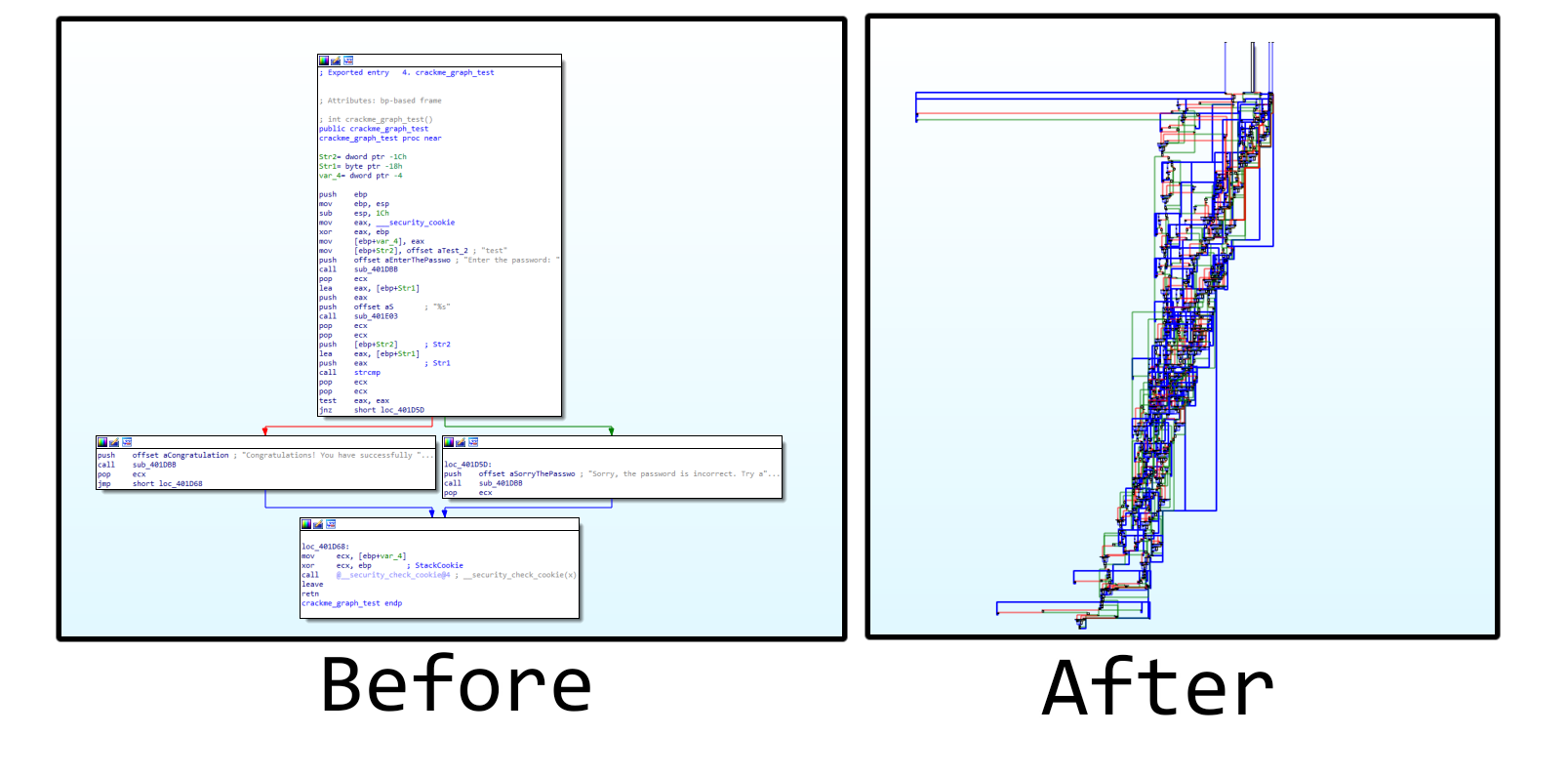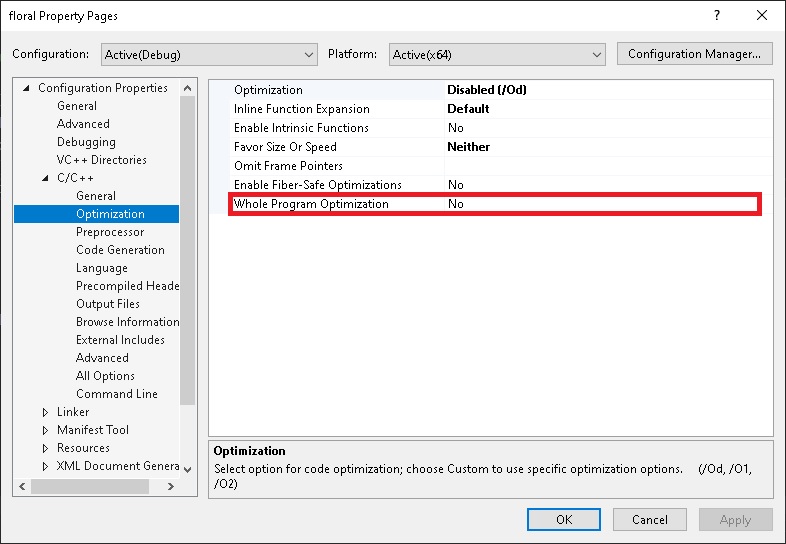Obfusheader.h is a header-only library for C++14 and above, offering features like compile-time obfuscation using metaprogramming (string & decimal encryption, control flow, call hiding). It is self-contained, compatible with Windows and Unix, and supports g++, gcc, and Visual C++ compilers on various CPU architectures. This header simplifies adding basic protection to sensitive data in your binaries and supports g++ compilation arguments (-O3, Os, -fPIC, etc).
- Fully compile-time contant encryption (any types, including strings, decimals & chars) with two modes - threadlocal & normal and random key generation in compile-time)
- Call hiding (using compile-time function pointer array shuffling)
- Imports hiding (cross-platform via GetProcAddress on windows & dlsym on linux) with import name encryption
- if/else/while/for/switch compiletime branching mutation (inline control flow, branch redefinition)
- Purely compile-time random providers based on macro constants (__TIME__, __LINE__, __COUNTER__)
- Completely break decompiler such as IDA pro using unusual inline ASM blocks & indirect branching
- Watermarking & leaving fun messages for crackers in your binaries which will appear in decompiler and stack trace
- Fake signatures to trick DIE (Detect-It-Easy) and other detectors into thinking the binary is protected via VMProtect, Themida & other popular protectors
- Fully inline internal implementation of common C methods such as strcmp, memcmp, strcmp, etc to avoid hooking & make reversing harder
You can change them in the start of obfusheader.h. This will affect how the obfuscation works in different ways.
#pragma region CONFIG
// C++ only features
#define CONST_ENCRYPTION 1
#define CONST_ENCRYPT_MODE NORMAL // NORMAL & THREADLOCAL
#define CFLOW_CONST_DECRYPTION 1
// C & C++ features
#define CFLOW_BRANCHING 0
#define INDIRECT_BRANCHING 0
#define FAKE_SIGNATURES 0
#define INLINE_STD 1
#define KERNEL_MODE 0
#pragma endregion CONFIGYou can encrypt strings and any xor-able decimals easily. The macro is universal - it accepts any supported type as an argument.
printf("char*: %s\n"
"int (dec): %d\n"
"long long: %llu\n"
"int (hex): 0x%x\n"
"boolean: %d\n",
OBF("test"), OBF(123),
OBF(9223372036854775807),
OBF(0x123), OBF(true));The logic of the program won't be affected and the original values will be restored during runtime and never present in the binary.
// Not safe, since the string might get deallocated upon compiling with optimizations
const char* str = OBF("test");
printf("1: %s\n", str);
// Safe, since the string is passed directly inside the method and stack memory has 0 chances to get deallocated
printf("2: %s\n", OBF("test"));
// Safe, since we create the encrypted storager and decrypt the string only when required
auto obf = MAKEOBF("test");
printf("3: %s\n", (char*)obf);Obfusheader allows you to hide calls to any internal methods by generating randomly shuffled function pointer arrays in compiletime and obfuscating the origin index.
CALL(&printf, "Very secure call\n");You can hide any calls exported from external libraries on both linux and windows. (I will port to PEB walking soon enough, stay tuned)
if (CALL_EXPORT("kernel32.dll", "LoadLibraryA", int(*)(const char*), "user32.dll"))
CALL_EXPORT("user32.dll", "MessageBoxA", int(*)(int, const char*, const char*, int), 0, "Real", "Msgbox", 0);You can leave messages and ASCII arts in your binary which will not affect execution, but will be displayed in IDA/GHIDRA decompilers. To do that use the WATERMARK macro. Inspired by REpsych and some java obfuscators which also do that.
WATERMARK(" ",
" 00 00 ",
" 00000 0000 ",
" 0 000 0000 0 ",
" 000 000 0000 0 0 ",
" 00 0000 000000 000 00 ",
" 0000000 000 0 000 0 00 00 0 00 ",
" 0 0 0 0 0 00 00000000 000 000000 ",
" 0 0 0 0 0 00 00 00 0 00 0 0 0 0 ",
" 0 0 0 0 0 0 00 000 0 000 0 0 0 ",
" 0 0 0 0 0 0 0 00000 000 0 0 0 0 0000 ",
" 0 0 0 0 0 000 0 0 0 0 ",
" 0 0 0 0 0000000 0 0 0 ",
" 0 00000000 000000 0 0 ",
" 0 00000000000 0 00 ",
" 0 0 0 000 0 0 0 0 ",
" 00000000 ",
" 000000000 ",
" 000000000 ",
" 000 ",
" ");This is a windows-only (currently) feature, allowing to add fake detections to mimic powerful protections. First thing any reverse-engineer does is doing basic analysis on the binary via Detect-It-Easy, PeExeInfo or Nauz File detector. Fake signatures allow to trick crackers into thinking that the software was protected with multiple decent protectors and makes them doubt it's worth the time to reverse it.
Obfusheader uses a few unique macroses which can be used in your programs. RND(min, max) can be used to generate random decimals in compiletime.
printf("Some random value: %d\n", RND(0, 10));INLINE can be used to forcefully inline any method.
INLINE void do_something() {
// the method will be fully inlined on any compiler
}Also obfusheader reimplements most common C methods fully inlined, including: strcpy, strlen, strncat, strcmp, strncmp, strstr. You can use those methods to achieve more secure operations and prevent reversers from hooking their standard implementations.
if (inline_strcmp(password, correctPassword) == OBF(0)) {
printf(OBF("Congratulations! You have successfully cracked the program. \n"));
} else {
printf(OBF("Sorry, the password is incorrect. Try again!\n"));
}Special thanks to these people: DosX-dev, RandomPerson7 for suggestions & great ideas! Your help is greatly appreciated







